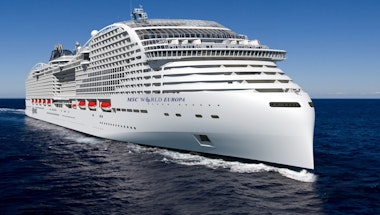Country or Region selection
Worldwide MSC International
Europe
CLEAN MARINE FUELS: TOTAL TO SUPPLY MSC CRUISES’ UPCOMING LNG-POWERED CRUISE SHIPS
25/03/2021• LNG fuel will sharply reduce emissions from ships and improve air quality at all ports of call
• New MSC Cruises’ LNG vessels to be the most technologically and environmentally advanced in the world
London, United Kingdom March 25, 2021 - MSC Cruises and Total announced today a supply agreement for approximately 45,000 tons per year of Liquefied Natural Gas (LNG) to MSC Cruises’ upcoming LNG-powered cruise ships.
Pierfrancesco Vago, MSC Cruises’ Executive Chairman, said: “This agreement represents a further step in our ongoing journey towards continuously reducing our environmental footprint, for which LNG is currently a crucial component. As we prepare to launch our first of three upcoming LNG-powered cruise ships in 2022, through this key agreement we have now secured the refuelling support for our latest-generation and most environmentally advanced ships in the Mediterranean.”
Used as a marine fuel, LNG sharply reduces emissions from ships, resulting in a significant improvement in air quality, particularly for communities in coastal areas and port cities. This agreement therefore impacts positively not only the place where LNG bunkering will take place, Marseilles, but also all the ports where the cruise ships will make their future calls around the Mediterranean Sea.
MSC Cruises’ LNG powered vessels will be amongst the most technologically advanced cruise ships in the world, bringing a range of environmental innovations to the market. Chief amongst these is a 50-kilowatt, LNG-powered solid oxide fuel cell technology project that offers a potential to reduce greenhouse gas emissions by a further 25% compared to a conventional LNG engine.
Total will bunker MSC Cruises’ LNG-powered cruise ships sailing on Mediterranean routes by ship-to-ship transfer, using its second LNG bunker vessel currently under construction. This vessel will meet the highest technical and environmental standards, using LNG herself as propulsion fuel and integrating a complete re-liquefaction of the boil-off gas.
LNG as a marine fuel
LNG as a marine fuel has gained positive momentum as the global shipping industry looks to adapt to stricter emissions standards.
Used as a marine fuel, LNG helps to cut:
- Sulfur emissions by 99%,
- Fine particle emissions by 99%,
- Nitrogen oxide emissions by up to 85%,
- Greenhouse gases emissions by around 20%.
LNG represents an available and competitive solution that contributes to the International Maritime Organization’s (IMO) long-term strategy of reducing greenhouse gas emissions from ships. Traction in developing LNG bunkering infrastructure has consequently expanded with several leading ports and LNG bunker suppliers alike having established key initiatives and made significant progress in support of these developments. LNG as a marine fuel also lays the foundation for the introduction of greener bioLNG in the future.
